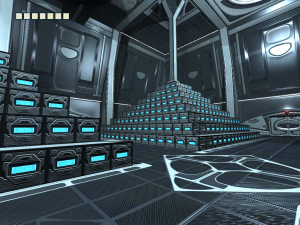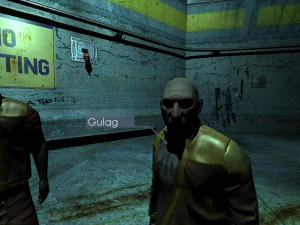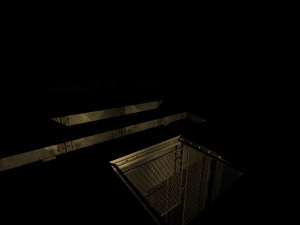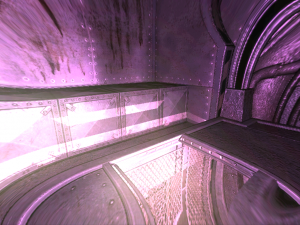Killer 7: What is Weird?
What makes a game weird?
Killer 7 has weird stuff going on in it, to be sure. But so do a lot of games. Is an assassin who transforms into someone else every time he passes in front of a video camera any stranger than a plumber who kills evil turtles by jumping on them? Isn’t it weird for a hero to periodically take breaks to smash every crate in the vicinity? If Killer 7 is noticeably strange, it’s because the designers chose to make its strangeness noticeable. I think I can identify some of the techniques they used to accomplish this.
First, the very notion of weirdness only exists in contrast to an expected normality. Smashing crates is normal enough in certain genres of game to not produce this contrast, and the likes of the Mario games exist in their own cartoon space, disconnected enough from reality that it defines its own norms. Killer 7 juxtaposes its internal madness with more conventional material — I won’t say “realistic”, because it’s not, but stuff adhering to genre norms. I’ve already described the contrast between the gameplay and an anime-styled cutscene, but it starts much earlier than that. The first two members of your team that you get a chance to see look like they stepped out of a crime movie: a cool, seen-it-all professional, a brassy, confident hitman. (The characters are communicated largely through body language, something the game excels in.) The initial cutscene, for all its stylization, supports this with its images of Garcian Smith clandestinely receiving a package from his contact. Having established this much context, then, the game proceeds to get weird.
Secondly, weirdness is uncomfortable. It teases the parts of the mind that try to fit things into familiar patterns. So I posit that increasing the sense of mental discomfort can increase the sense of the weird. This is a point I’m not entirely convinced of, but discomfort of various sorts is certainly something Killer 7 exploits, for whatever reason. There’s moral discomfort: one of the recurring NPCs is the ghost of Travis, the first person the player character killed, who makes things worse by being helpful even in death, your one consistent source of good information. Travis also casts doubt on your goals, informing you in the second mission how the man you’re trying to kill is the only thing preventing the world government from annihilating Japan. There’s bodily discomfort: a rather oogy cutscene at the beginning of mission 2 shows Harman Smith, an old man in a wheelchair, being slapped around by his maid, for reasons I have yet to see explained, except for some slight implication that it’s part of her duties. There’s discomfort at the gradually dawning realization that the Killer 7, which looked so cool in the beginning, is composed mostly of freaks and lunatics — and that they may be the best hope for their fallen world.
Thirdly, relating to the above, it seems weirder if you don’t understand what’s going on. Call it the David Lynch principle. Of course, in order for this to be effective, you have to know that you don’t understand what’s going on. Killer 7 cultivates this knowledge, giving you repeated motifs like the whole TV thing, or a particular severed head that keeps showing up in different places, as clear symbols of stuff that’s clearly important that you don’t understand yet. That maid that I mentioned: She shows up in Harman’s room, which is strangely accessible through doors in each level. Sometimes she’s in uniform, in which case she’ll save the game for you on request (using the television in the room, natch). Sometimes she’s in her street clothes, in which case she won’t help you at all. In that cutscene I mentioned, where she’s beating Harman up, she’s in street clothes at first, but instantly changes to the maid’s uniform when Garcian Smith turns out the lights. This seemed like a revelation: Aha! A consistent pattern! This applies to all the instances of Harman’s Room: she’s in uniform only if the room is dark! I understand now! Except that actually I don’t understand at all. The moment of revelation just throws the incomprehensible nonsense into relief.
All of the above applies even more strongly in Silent Hill 2. No wonder they’re both on Yahtzee’s list.
 Comments(1)
Comments(1)



